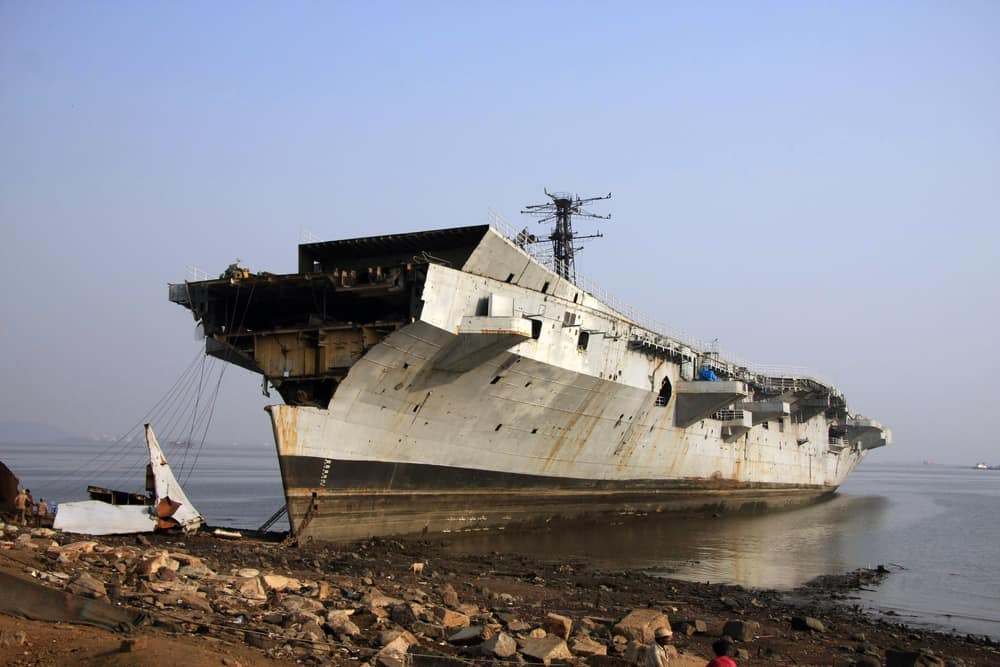
This year, falling freight rates have led many shipping lines to send their old oil tankers to an early grave – to the South Asian shipbreaking yards where they are torn down over a matter of weeks and end up as a scrap pile. On the shores of Bangladesh, which hosts the world’s largest ship recycling industry, shipbreaking is often seen as the work of hired hands from the poorest sections of the Bangla society.
“Shipbreaking started in Bangladesh in the 1960s. It happened when local people saw that breaking ships was a bit profitable, and they started getting financing for the job – there was no environmental or workers’ safety concern at that time,” said Mohammed Ali Shahin, program officer of NGO Shipbreaking Platform in Bangladesh. “From 2000, NGOs like us and the media are concerned about the issue.”
The problems facing the community indulged in the trade is alarming. The shipbreaking industry witnesses several violations in its daily operations including environmental pollution, dearth of safety regulations and accidents caused due to it, worker exploitation, and inadequate waste management facilities.
The daily laborers on the shore are predominantly people hailing from the northern part of Bangladesh, who move down south in search of jobs and a better living. “These workers come from poverty-stricken areas, and don’t have any chance of generating income in their villages. The shipbreaking industry is easy to get a job in, as it does not need any training or certificate – you just go there, and if you have a person to contact, you can join in,” said Shahin.
The people who control the trade are influential people in Bangladesh, and in the absence of regulations and compliance mechanisms in the industry, turn a blind eye to the plight of workers. This resulted in various accidents over the years, till NGOs started intervening in and advocated for safety regulations in the trade, bringing national and international attention to the industry.
“In 2009, the Bangladeshi court gave a judgment that all ships coming to the yard should be pre-cleaned of all the debris on-board. Since 2012, the shipbreaking industry is being regulated by the Bangladesh Ministry of Industry,” said Shahin.
Though conditions have considerably improved, Shahin felt that a lot more could be done to improve the working conditions of laborers. “Accidents are still happening, and 14 workers have already died this year. Workers are still working without safety equipment in most of the yards,” he said. However, Shahin is quick to add that a few yards are actively looking to improve the situation, by getting certified through national governing bodies for being compliant with the existing standards.
“As an NGO, we help the workers by educating them on the risks involved and their basic rights as workers. We also communicate with the owners and try helping the government to improve the situation by creating a comprehensive approach to upgrading shipbreaking yards,” he said.
The International Maritime Organization (IMO) and UN Environmental Programme (UNEP) have initiated laws like the Hong Kong convention that provides guidelines on ship recycling and regulations on how the ships need to be sent into the yard. To an extent, the ships coming into the Bangladeshi shore accentuate the environmental and workers’ health crisis.
“Ships coming in from Europe bring in a lot of waste. We try to raise the issue that it is not our waste and that EU shipping companies should be responsible for that,” said Shahin. “We send the message that the EU countries and their shipping companies should contribute to the development of the shipbreaking industry by bringing waste management facilities and also ensuring safe recycling of their ships that come into Bangladesh.”
Apart from Bangladesh, countries like India, Pakistan, and China also process ship scrap, but Beijing is now looking to stop further activities in ship recycling – in accordance with its new environmental protection laws. China currently breaks down around 2.5 million tonnes of shipping scrap every year, and it leaving the market would put additional pressure on the Indian subcontinent.
The 2020 IMO sulfur cap regulation would render many ships unusable, and this could lead to a lot more vessels making their way to the recycling yard. Regardless of this, the only sensible way forward would be for shipping lines to strictly meet regulations and make sure the community that services scrap does not end up suffering because of it.
Stay up-to-date with the latest commentary and insights on FreightTech and the impact to the markets by subscribing.
